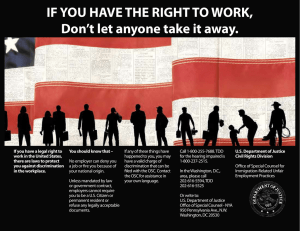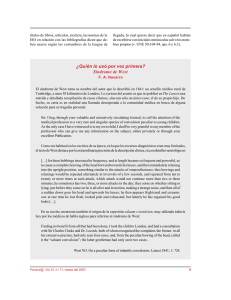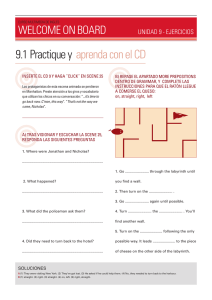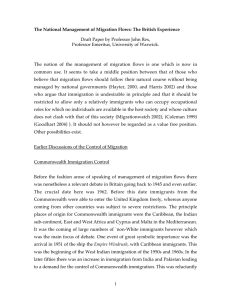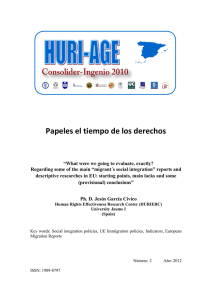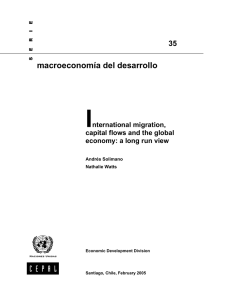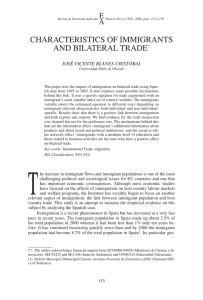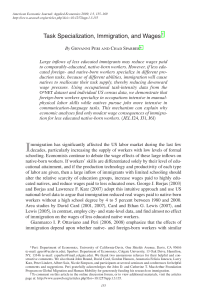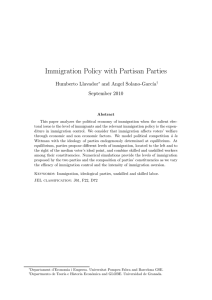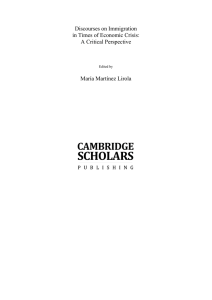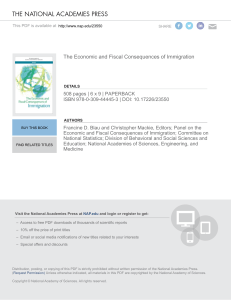WHY ARE THEY HERE? - Campaign for Migrant Worker Justice
Anuncio
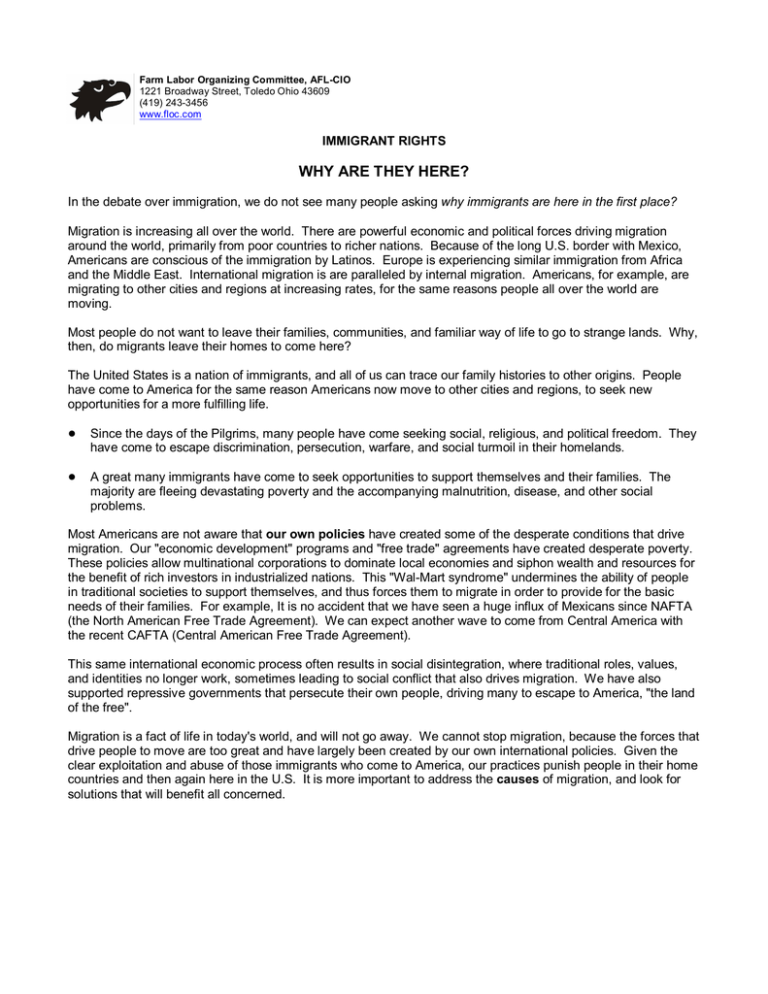
Farm Labor Organizing Committee, AFL­CIO 1221 Broadway Street, Toledo Ohio 43609 (419) 243­3456 www.floc.com IMMIGRANT RIGHTS WHY ARE THEY HERE? In the debate over immigration, we do not see many people asking why immigrants are here in the first place? Migration is increasing all over the world. There are powerful economic and political forces driving migration around the world, primarily from poor countries to richer nations. Because of the long U.S. border with Mexico, Americans are conscious of the immigration by Latinos. Europe is experiencing similar immigration from Africa and the Middle East. International migration is are paralleled by internal migration. Americans, for example, are migrating to other cities and regions at increasing rates, for the same reasons people all over the world are moving. Most people do not want to leave their families, communities, and familiar way of life to go to strange lands. Why, then, do migrants leave their homes to come here? The United States is a nation of immigrants, and all of us can trace our family histories to other origins. People have come to America for the same reason Americans now move to other cities and regions, to seek new opportunities for a more fulfilling life. ! Since the days of the Pilgrims, many people have come seeking social, religious, and political freedom. They have come to escape discrimination, persecution, warfare, and social turmoil in their homelands. ! A great many immigrants have come to seek opportunities to support themselves and their families. The majority are fleeing devastating poverty and the accompanying malnutrition, disease, and other social problems. Most Americans are not aware that our own policies have created some of the desperate conditions that drive migration. Our "economic development" programs and "free trade" agreements have created desperate poverty. These policies allow multinational corporations to dominate local economies and siphon wealth and resources for the benefit of rich investors in industrialized nations. This "Wal­Mart syndrome" undermines the ability of people in traditional societies to support themselves, and thus forces them to migrate in order to provide for the basic needs of their families. For example, It is no accident that we have seen a huge influx of Mexicans since NAFTA (the North American Free Trade Agreement). We can expect another wave to come from Central America with the recent CAFTA (Central American Free Trade Agreement). This same international economic process often results in social disintegration, where traditional roles, values, and identities no longer work, sometimes leading to social conflict that also drives migration. We have also supported repressive governments that persecute their own people, driving many to escape to America, "the land of the free". Migration is a fact of life in today's world, and will not go away. We cannot stop migration, because the forces that drive people to move are too great and have largely been created by our own international policies. Given the clear exploitation and abuse of those immigrants who come to America, our practices punish people in their home countries and then again here in the U.S. It is more important to address the causes of migration, and look for solutions that will benefit all concerned. FOR MORE INFORMATION, SEE THE FOLLOWING LINKS: The Roots of Migration, American Friends Service Committee http://www.afsc.org/immigrants­rights/learn/roots.htm International Migration, Stalker's Guide to International Migration http://pstalker.com/migration/index.htm Irresistible Attraction, Economist Vol. 365 Issue 8297 http://www.iupui.edu/~anthkb/a104/migration/irresistable%20attraction.htm More Losers Than Winners from WTO’s “Free Trade”, Third World Network http://www.twnside.org.sg/title/losers.htm NAFTA and Migration, National Forum Vol. 74 Issue 3 http://www.iupui.edu/~anthkb/a104/mexico/naftaimmig.htm Economic Globalization and Human Rights, Amnesty International http://web.amnesty.org/pages/ec­index­eng The Economics of Necessity, American Immigration Law Foundation http://www.ailf.org/ipc/economicsofnecessity.asp Myths and Facts in the Immigration Debate, American Immigration Lawyers Association http://www.aila.org/content/default.aspx?docid=17242 Core Rights of Concern to Migrants, Seminar on Human Rights and Migrants, 1998 http://www.rcmvs.org/pagina_n5x.htm Immigrants' Rights, American Friends Service Committee http://www.afsc.org/immigrants­rights/default.htm Understanding Anti­Immigrant Movements, American Friends Service Committee http://www.afsc.org/immigrants­rights/learn/anti­immigrant.htm National Survey of Voter Attitudes on Immigration, National Immigration Forum http://www.immigrationforum.org/documents/PressRoom/VoterAttitudesOnImmigration.pdf Immigration Reform, National Immigration Forum http://www.immigrationforum.org/DesktopDefault.aspx?tabid=148 Justice for Immigrants, Catholic Campaign for Immigration Reform http://www.justiceforimmigrants.org/ New American Opportunities Campaign http://www.cirnow.org/ National Immigration Law Center http://www.nilc.org/ Farm Labor Organizing Committee, AFL­CIO 1221 Broadway Street, Toledo Ohio 43609 (419) 243­3456 www.floc.com DERECHOS COMO INMIGRANTES ¿POR QUÉ ESTÁN AQUÍ? En el debate sobre inmigración, no hay mucha gente preguntándose: ¿porqué es que los inmigrantes están aquí? La migración ha estado en aumento alrededor del mundo. Fuerzas económicas y políticas muy poderosas están empujando la migración alrededor del mundo, especialmente de países pobres a paises más ricos. Como resultado de la frontera tan larga entre los Estados Unidos y México, los estadounidenses están muy conscientes de la inmigración de latinos. Europa está pasando por una situación similar de inmigración de personas de África y el Medio Oriente. La migración a nivel internacional es paralela a la migración interna de los países. Los estadounidenses, por ejemplo, están migrando a otras ciudades y regiones de los Estados Unidos, por las mismas razones que otros migrantes se están moviendo alrededor del mundo. La mayoría de las personas no quieren dejar a sus familias, comunidades, y tradiciones, para mudarse a tierras extrañas. Entonces, ¿porqué los migrantes se van de sus hogares para venir aquí? Los Estados Unidos es una nación de inmigrantes, y la mayoría de los estadounidenses puede buscar en la historia de su familia hasta encontrar sus orígenes en otras tierras. La gente ha venido a los Estados Unidos por las mismas razones por las cuales los estadounidenses se mudan a otras ciudades y regiones del país: para buscar nuevas oportunidades y una mejor calidad de vida. ! Desde el tiempo de los peregrinos, mucha gente ha venido buscando libertad social, de religión, y política. Han venido escapando de la discrimnación, persecusión, guerras, y problemas sociales en sus países. ! Muchos inmigrantes han venido buscando oportunidades para mantener a sus familias y a ellos mismos. La mayoría están escapando de una pobreza devastadora, la cual trae malnutrición, enfermedades y otros problemas sociales. La mayoría de los estadounidenses no se dan cuenta de que nuestra propia política pública ha creado algunas de estas condiciones las cuales crean la necesidad de migrar. Los programas de "desarrollo económico" y los tratados de "libre comercio" han creado pobreza devastadora. Estas políticas le permiten a corporaciones multinacionales a que dominen las economías locales y utilizen riquezas y recursos para el beneficio de invercionistas ricos de naciones industrializadas. Con este "síndrome de Wal­Mart" es difícil que la gente se mantenga económicamente de maneras tradicionales; estos cambios empujan a las personas a migrar para poder proveer las necesidades básicas de sus familias. No es coincidencia veamos un gran aumento en inmigrantes mexicanos desde que el NAFTA fue aprobado (el Tratado de Libre Comercio de América del Norte). Podemos esperar otra ola de inmigrantes, esta vez de América Central, tras el reciente acuerdo CAFTA (el Tratado de Libre Comercio de América Central). Este mismo proceso de economía internacional muchas veces desemboca en una desintegración social ya que los roles tradicionales, valores, e identidad nacional, dejan de funcionar. Muchas veces esto lleva a conflictos sociales los cuales también crean la necesidad de inmigrar. Los Estados Unidos también han apoyado a gobiernos represivos los cuales persiguen a su propia gente, empujándolos a escapar a los Estados Unidos, "la tierra de la libertad". La migración ya es parte del mundo en que vivimos hoy en día, y no va a parar. No podemos parar la migración porque las fuerzas que empujan a la gente a moverse son muy poderosas y han sido creadas mayormente por nuestras propias políticas internacionales. Dada la explotación y el abuso de los inmigrantes que vienen a los Estados Unidos, nuestras prácticas castigan a las personas en sus propios países y luego las castigan otra vez cuando entran a los Estados Unidos. Por lo tanto, es muy importante darse cuenta de qué es lo que causa la inmigración, y buscar soluciones para el beneficio de todos. ¿Conoce usted a alguien que quiera compartir su historia del por qué está aquí? Por favor, dígale que se ponga en contacto con nosotros. PARA MÁS INFORMACIÓN, CONSULTE LAS SIGUIENTES FUENTES: The Roots of Migration, American Friends Service Committee http://www.afsc.org/immigrants­rights/learn/roots.htm International Migration, Stalker's Guide to International Migration http://pstalker.com/migration/index.htm Irresistible Attraction, Economist Vol. 365 Issue 8297 http://www.iupui.edu/~anthkb/a104/migration/irresistable%20attraction.htm More Losers Than Winners from WTO’s “Free Trade”, Third World Network http://www.twnside.org.sg/title/losers.htm NAFTA and Migration, National Forum Vol. 74 Issue 3 http://www.iupui.edu/~anthkb/a104/mexico/naftaimmig.htm Economic Globalization and Human Rights, Amnesty International http://web.amnesty.org/pages/ec­index­eng The Economics of Necessity, American Immigration Law Foundation http://www.ailf.org/ipc/economicsofnecessity.asp Myths and Facts in the Immigration Debate, American Immigration Lawyers Association http://www.aila.org/content/default.aspx?docid=17242 Core Rights of Concern to Migrants, Seminar on Human Rights and Migrants, 1998 http://www.rcmvs.org/pagina_n5x.htm Immigrants' Rights, American Friends Service Committee http://www.afsc.org/immigrants­rights/default.htm Understanding Anti­Immigrant Movements, American Friends Service Committee http://www.afsc.org/immigrants­rights/learn/anti­immigrant.htm National Survey of Voter Attitudes on Immigration, National Immigration Forum http://www.immigrationforum.org/documents/PressRoom/VoterAttitudesOnImmigration.pdf Immigration Reform, National Immigration Forum http://www.immigrationforum.org/DesktopDefault.aspx?tabid=148 Justice for Immigrants, Catholic Campaign for Immigration Reform http://www.justiceforimmigrants.org/ New American Opportunities Campaign http://www.cirnow.org/ National Immigration Law Center http://www.nilc.org/
